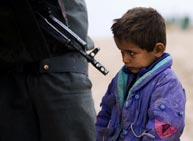Nita Bhalla
NEW DELHI - The world is ignoring the daily deaths of more than 850 Afghan children from treatable diseases like diarrhoea and pneumonia, focusing on fighting the insurgency rather than providing humanitarian relief, Save the Children said on Wednesday.

An Afghan boy looks on as his father is searched by a policeman at a checkpoint in Nimroz province, southern Afghanistan. (Photo: REUTERS/Marko Djurica)
According to the British charity, a child dies in the impoverished, war-torn nation every two minutes - mainly due to poverty, malnutrition and a lack of basic healthcare - and Afghan children have the worst chance in the world of surviving to their fifth birthday.
Launching an emergency appeal to boost its work treating malnourished children, supporting clinics and distributing household essentials, the charity said the scale of the crisis was being "hidden", with global attention concentrated on the conflict due to the large presence of foreign troops.
"There has been a lot of focus on the insurgency and the military campaign but in the meantime a humanitarian crisis has been allowed to persist," George Graham, Save the Children's senior policy manager, told AlertNet by phone from London.
"For a country that has as much international attention as Afghanistan but still continues to have such poor child and maternal mortality rates and malnutrition levels is really shocking."
Afghanistan is one of the poorest countries in the world, second only to Niger in sub-Saharan Africa, according to the U.N. Human Development Index in 2009.
Over three decades of violence have left Afghanistan's infrastructure in ruins, its government and police corrupt, and the majority of its people living a hand-to-mouth existence.
U.S.-backed Afghan forces toppled the Taliban in late 2001, but despite the presence of thousands of foreign troops who are battling to weed out insurgents, violence persists.
Save the Children said it also fears a major drought this year because of a lack of snow during the winter.
UNEQUAL AID
Aid workers say conflict, lack of development and poor distribution of aid have left a shameful legacy.
A quarter of all children born in the country die before the age of five, while nearly 60 percent of children are malnourished and suffer physical or mental problems, Save the Children said.
In some rural areas, more than 90 percent of girls do not go to school and many children are forced to work to support their families. Every half an hour a woman dies from a pregnancy-related problem, the charity added.
Children have also been directly hit by violence, according to Afghanistan Rights Monitor, with more than 1,050 children killed last year as a result of suicide attacks, air strikes, explosions and being caught in the crossfire - the deadliest year since the fall of the Taliban.
Save the Children called on the international community - which has poured in more than $20 billion in aid over the last eight years - to distribute funds more equitably throughout the country.
"We believe that there is more aid going into areas like Helmand province where there is a large concentration of British troops," said Graham. "But there are many areas across the country which are impoverished and we want aid to reach everyone who needs it - especially children."
In a statement, the charity criticised the approach - adopted by Britain and other countries under the NATO umbrella - of having soldiers undertake aid activities in an effort to win over the local population.
"Funding soldiers to carry out humanitarian work such as rebuilding schools threatens the impartiality of aid agencies working on the ground and makes it much more dangerous for us to operate in the country," said Patrick Watt, Save the Children's director of development policy. "It could also turn hospitals or schools rebuilt with military help into targets and put children's lives at risk."



